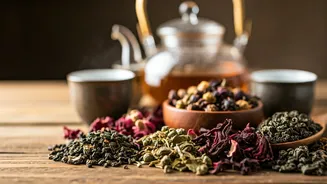Tea's Cholesterol Connection
Herbal teas, often celebrated for their soothing qualities, have gained recognition for their potential to help manage cholesterol. Unlike traditional
medicines, herbal teas offer a gentle, natural approach. They contain compounds that can affect cholesterol absorption and production in the body. However, it's crucial to understand that herbal teas are not a replacement for medical treatments, but can be a valuable addition to a holistic approach to health. They complement lifestyle changes like a balanced diet and regular exercise. The specific mechanisms vary among different teas, but the common goal is to support healthy cholesterol levels and overall cardiovascular well-being. It is always wise to consult with a healthcare professional before incorporating herbal teas into your routine, especially if you're already taking medications.
Green Tea's Powerhouse
Green tea is packed with antioxidants, most notably catechins, which have been linked to several health benefits, including better cholesterol management. Research suggests that consuming green tea regularly may lead to a reduction in LDL cholesterol, often referred to as 'bad' cholesterol, and an increase in HDL cholesterol, or 'good' cholesterol. These antioxidants help prevent the oxidation of LDL cholesterol, which can contribute to the buildup of plaque in arteries. To enjoy the advantages of green tea, brew a cup by steeping green tea leaves in hot water (around 170-180°F or 77-82°C) for a few minutes. This process allows the beneficial compounds to release into the water. It’s also crucial to remember that the effects of green tea can vary from person to person, and it’s best consumed as part of a balanced diet and healthy lifestyle.
Oolong Tea's Role
Oolong tea, a partially oxidized tea, bridges the gap between green and black tea and also offers potential cholesterol-lowering effects. It contains compounds that can influence lipid metabolism, potentially leading to lower LDL cholesterol levels. Additionally, Oolong tea's ability to help metabolize fats can indirectly support healthy cholesterol profiles. Regularly drinking Oolong tea is a simple way to introduce these benefits into your daily routine. When preparing Oolong tea, it's essential to use water that is approximately 190-200°F (88-93°C) and allow the leaves to steep for a few minutes to fully extract the flavors and active compounds. Because of its unique oxidation process, Oolong tea offers a diverse range of flavors. As with any herbal remedy, individual responses to Oolong tea may vary, and it's best combined with a balanced diet for optimal results.
Hibiscus Tea's Benefits
Hibiscus tea, known for its vibrant red color and tart flavor, is another herbal tea that might have a positive impact on cholesterol levels. Studies have indicated that hibiscus can help reduce LDL cholesterol, triglycerides, and overall cholesterol levels, potentially improving cardiovascular health. The antioxidants and other bioactive compounds in hibiscus contribute to these effects. To prepare hibiscus tea, steep the dried hibiscus flowers in hot water (around 200°F or 93°C) for several minutes. This process will extract its unique flavor and health-promoting properties. The tea can be enjoyed hot or cold and can be easily customized with natural sweeteners or other herbs to suit your taste. Its tangy flavor also makes it an excellent addition to a healthy diet. However, like any herbal tea, it is advisable to check with a healthcare provider before increasing your hibiscus tea intake.
Other Beneficial Teas
Beyond green, Oolong, and hibiscus teas, other herbal options can support cholesterol management. Black tea, although fully oxidized, contains antioxidants and may have modest cholesterol-lowering effects. Similarly, Rooibos tea, originating from South Africa, has shown promise in improving lipid profiles. While the research on these teas may not be as extensive as for the more well-studied options, they can still offer additional health benefits. When exploring these teas, experiment with different brewing methods to optimize the taste and health benefits. Remember that the key is consistent consumption as part of a healthy lifestyle. Moreover, considering lifestyle factors like regular exercise and a balanced diet enhances the effects of herbal teas. It's also important to be mindful of how your body responds to each type of tea and any potential interactions with other medications you may be taking.
Making Tea a Habit
Integrating herbal teas into your daily life can be a refreshing and beneficial habit. Start by incorporating one or two cups of your preferred tea into your routine each day. Experiment with various teas to discover which ones you enjoy most, thereby increasing the likelihood of making it a long-term habit. Consistency is key when it comes to experiencing the potential health benefits, so try to make tea consumption a regular part of your day, such as after meals or as a relaxing ritual. Moreover, you can enhance the flavor and health benefits of your tea by using high-quality loose-leaf teas and fresh, filtered water. Consider adding spices like cinnamon or ginger, which may offer additional health advantages. Be patient and give your body time to adjust, while monitoring for any changes or side effects.
Important Considerations
While herbal teas can contribute to healthy cholesterol management, it's crucial to acknowledge the limitations and considerations. Herbal teas should not replace medical treatments or prescribed medications for high cholesterol. Always consult with a healthcare professional before making significant changes to your diet or treatment plan. Additionally, be aware of any potential side effects or interactions between herbal teas and any medications you are taking. Pay attention to how your body reacts to different teas and be mindful of your individual health profile. It's also essential to purchase herbal teas from reliable sources to ensure quality and safety. Quality teas often contain the highest concentrations of beneficial compounds. Remember that results can vary from person to person. A balanced approach that combines herbal teas with a healthy lifestyle is the best way to support your overall health and well-being.


















